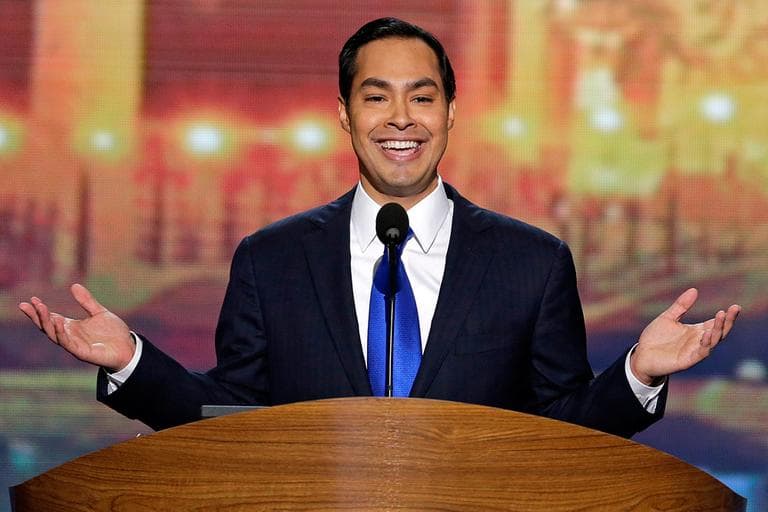Advertisement
Poignant Stories Of Wealthy Politicians

We should feel sorry for candidates who were never poor. If they can't give us inspiring stories of adversity, why are they wasting our time in this reality show called electiontainment?
Thank goodness we don’t have candidates who never suffered financially. The last thing we need is a leader like Teddy Roosevelt, Franklin Roosevelt or John Kennedy. No, when housing values have collapsed, we need a president who knows what it’s like to live in a log cabin. We need pols who can verify in painful detail the hardships they suffered before they became millionaires.
We got some great tales of woe in our Senate race early, as two wealthy candidates competed for who is the most populist. NPR’s Tovia Smith told the story on Dec. 21, 2011:
One ad features Brown's green pickup truck and worn-out barn coat. He stresses his hard-knocks upbringing by a single mom on and off welfare. He pretty much had that market cornered in the last election — but not this time. "I grew up on the ragged edge of the middle class, and I know it's hard out there," Warren says in her ad.
Warren entered the race swinging back against Republican suggestions that she's part of the out-of-touch Harvard elite. Brown's camp calls her "Professor Warren" every chance it gets, trying to box her in as an ivory-tower type — someone more likely to share a chardonnay than kick back with a beer. But Warren is telling a different story, of her Oklahoma childhood. "We lost our car, the medical bills piled up. My mom went to work at Sears answering phones so that we could make the mortgage payments," she says in her ad.
It became a game of one downs-manship. Her father was a maintenance man. His father abandoned him, and his stepfathers abused him. She was so hard up, she started waiting tables at 13. He was so desperate for cash, he posed nude for a Cosmo centerfold. "You know, I didn't go to Harvard," he says, "I went to the school of hard knocks, and I did whatever I had to do to pay for school."
At the two party conventions, the keynote speakers competed on the issue of whose families sacrificed more so that they could become politicians:
Marco Rubio, GOP convention speech, Aug. 30:
A few years ago during a speech, I noticed a bartender behind a portable bar at the back of the ballroom. I remembered my father who had worked for many years as a banquet bartender. He was grateful for the work he had, but that's not the life he wanted for us. He stood behind a bar in the back of the room all those years, so one day I could stand behind a podium in the front of a room.
Julian Castro, Democratic convention speech, Sept. 4:
My grandmother never owned a house. She cleaned other people's houses so she could afford to rent her own. But she saw her daughter become the first in her family to graduate from college. And my mother fought hard for civil rights so that instead of a mop, I could hold this microphone.
We should pity the spouses of future presidential candidates who will have to be as poignant as Ann Romney and Michelle Obama if we are to take them seriously as character witnesses.
Ann Romney’s convention speech, Aug. 28:
We got married and moved into a basement apartment. We walked to class together, shared the housekeeping, and ate a lot of pasta and tuna fish. Our desk was a door propped up on sawhorses. Our dining room table was a fold down ironing board in the kitchen. Those were very special days.
Michelle Obama’s convention speech, Sept. 4:
You see, even back then, when Barack was a Senator and presidential candidate, to me he was still the guy who picked me up for our dates in a car that was so rusted out, I could actually see the pavement going by in a hole in the passenger side door. He was the guy whose proudest possession was a coffee table he'd found in a dumpster. And whose only pair of decent shoes was half a size too small.
All these stories of adversity are followed by notes of humility, like this statement by Castro: “My family's story isn't special. What's special is the America that makes our story possible.”
But is it crass to wonder why we’re hearing so much more about the candidates’ families and so much less about policy specifics? Evidently it is because polls and focus group research revealed to the campaigns that undecided voters are swayed less by issues than by character.
Remember the Grumpy Old Man character played by Dana Carvey on “Saturday Night Live”? He grew up poor too:
I'm oooooold! And I'm not happy! And I don't like things now compared to the way they used to be. All this progress — phooey! In my day, we didn't have these cash machines that would give you money when you needed it. There was only one bank in each state — it was open only one hour a year. And you'd get in line, 17 miles long, and the line became an angry mob of people — fornicators and thieves, mutant children and circus freaks — and you waited for years and by the time you got to the teller, you were senile and arthritic and you couldn't remember your own name. You were born, got in line, and ya died! And that's the way it was and we liked it!
Life was simpler then. There wasn't all this concern about hy-giene! In my day, we didn't have Kleenex. When you turned 17, you were given the family handkerchief. ... It hadn't been washed in generations and it stood on its own ... filled with diseases and swarmin' with flies. ... If you tried to blow your nose, you'd get an infection and your head would swell up and turn green and children would burst into tears at the sight o' ya! And that's the way it was and we liked it!
Since Clint Eastwood was at the GOP convention, perhaps Carvey’s character could speak at the Democratic convention and give a testimonial for VP Joe Biden. “When Joe was a child, he ate sticks for fiber. That’s the way it was and we liked it!”
This program aired on September 5, 2012. The audio for this program is not available.
